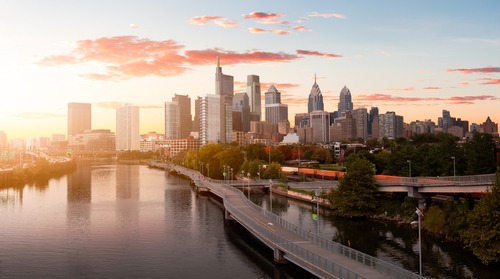
Philadelphia’s Office of Transportation, Infrastructure and Sustainability (OTIS) recently released a report that examines progress toward goals it set in 2018.
“In 2018, I committed my administration to work towards a future where our transportation system benefits everyone,” said Mayor Jim Kenney. “The COVID-19 pandemic and economic recession created one of the most challenging years ever in City government. While many of our initiatives have been delayed or reshaped by the pandemic, we’re proud that we’re still moving forward on all of the major goals that we set out in the CONNECT Plan in 2018.”
The city’s CONNECT plan established values, goals, strategies, and deliverables to guide transportation decisions from 2018-2025. The recent report, CONNECT: Philadelphia’s Strategic Transportation Plan Progress Update 2021, evaluates the progress of more than 100 deliverables and highlights challenges and successes.
Successes include the installation of automated speed enforcement cameras on Roosevelt Boulevard, which resulted in a 93 percent drop in speeding violations. The city’s first raised bicycle lanes were installed on American Street, two-way protected bicycle lanes were installed on 11th Street, and a protected bicycle lane was installed on 22nd Street. And the Municipal Clean Fleet Plan set a strategy to transition the city’s fleet to clean and electric vehicles.
Additionally, the city released its first comprehensive transit plan in 100 years. The plan features a range of policies and projects that the city will work with SEPTA and other partners to advance in coming years, including a slate of bus priority projects and a vision for the future of Regional Rail. The new pilot bus lanes on Market Street and JFK Boulevard, the first in Philadelphia in decades, are a step towards this vision.
Certain challenges include the increase of the number of fatalities to 88 percent over 2019. The city is far from its goal of delivering 40 miles of bike lanes by 2025 and is more than 10 years away from completing its trolley modernization project. And rising costs have hampered the city’s ability to provide paving and street maintenance.
Philadelphia is working in close partnership with the state’s federal delegation to work towards a generational investment in infrastructure.
“This is a significant opportunity, but one that brings its own set of challenges. We must work diligently to ensure that we choose the right projects, address bottlenecks to make sure projects are delivered, and ensure that the jobs resulting from City contracts build wealth for Philadelphia residents, especially in minority communities,” said Deputy Managing Director for Transportation Mike Carroll.